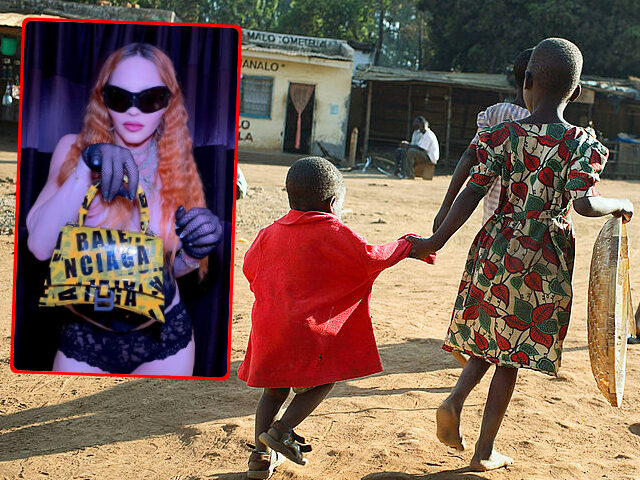A charitable organization called the Ethiopian World Federation (EWF) asked the government of Malawi this week to investigate another charity, Raising Malawi, for human trafficking, sexual exploitation, fraud, and exposing children to “homosexual and transgender” propaganda.
Raising Malawi was founded by 1980s pop star Madonna Louise Ciccone, better known as simply Madonna.
The EWF was founded in New York in 1937 to help Ethiopians who settled abroad, especially by protecting them from exploitation and fraud. The group’s portfolio eventually expanded to cover other African populations and the Caribbean.
Raising Malawi was founded in 2006 by Madonna, with a focus on education and medical care for children in that country.
Madonna adopted four children from Malawi beginning in the 2000s, occasionally fighting tempestuous battles against Malawian officials who said she did not meet the adoption requirements, such as residency in Malawi for at least 18 continuous months. Malawian critics accused the singer of using her phenomenal wealth and influence to “bully” government officials and demand “VIP treatment.”
Malawi’s Nyasa Times reported on Wednesday that the EWF filed a lengthy petition with Malawian President Lazarus Chakwera to investigate Raising Malawi and Madonna herself.
The petition asked Chakwera to “restrict her and her associates accessibility to Africa and to African children as a precautionary measure until a thorough investigation is done into child trafficking, sex exploitation, sexual slavery, adoption reversal, threat of coercion, fraud, deception and abuse of power or vulnerability.”
The petition reminded Chakwera that Malawi’s penal code bans “indecent practices between females” and inducements for children to behave as such. Madonna’s controversial 1992 softcore pornography book SEX was presented as evidence that the singer is very interested in promoting such practices. The petitioners felt that book alone should have been enough to block Madonna’s ultimately successful effort to adopt Malawian children in 2006.
The investigation demanded by the EWF would focus on Raising Malawi’s orphanage, which the petition accused of conducting “social experiments on vulnerable African children in Malawi,” and on Madonna’s alleged psychological and sexual exploitation of her adopted Malawian son David Banda.
“Pictures are awash on social media of David Banda wearing female clothes, makeup and wearing earrings – whilst the two holding hands like two lovers,” the Nyasa Times noted.
The EWF ran through some dismaying statistics about human trafficking and sexual abuse in Africa and around the world, pointing to poor vetting of adoptive parents as a major factor in child abuse.
The petition complained that Malawian officials did not perform an adequate “social background check” on Madonna when they approved her adoptions and did not properly consider the danger that she would use the children “as a social experiment in response to the heavy LGBTQ community push for sodomy in America.”
The BBC noted in 2018 that Madonna’s adoptions have long been a sore spot with some Malawians, who found the singer’s obsession with accumulating Malawian children somewhat disturbing and felt the government waived too many of its adoption requirements to accommodate her. Madonna’s camp, in turn, accuses the Malawian government of holding an irrational “grudge” against her charity.
The EWF is not the only activist group to warn that celebrity adoptions could encourage sexual abuse and human trafficking. A children’s charity in Malawi called Eye of the Child made the same argument in 2017 after Madonna adopted two young girls.
“We are really putting our children in a big danger. (Madonna’s act) definitely would facilitate trafficking of children through (encouraging more) adoption,” Eye of the Child director Maxwell Matewere told Reuters in 2017.
“Most of the adoption cases that have been allowed by social welfare and the high court have been questionable in terms of the processes. There is a lot of corruption,” Matewere said.
“The Madonna adoption would basically just open up for more children to be recruited. You are sending a wrong signal to the orphanages,” he warned.
These critics said that if governments waived adoption rules to accommodate celebrities, other applicants would demand waivers from the rules as well, eliminating safeguards against impoverished children getting adopted for sinister purposes. One activist from Uganda told Reuters his country has prosecuted cases of children adopted so their organs could be harvested and sold.
Another concern was that foreign celebs brandishing huge sums of money would inspire impoverished parents to simply sell their children. Both Madonna and another celebrity adopter, actress Angelina Jolie, have been accused of adopting children whose parents were still alive, apparently unwittingly in Jolie’s case.
Madonna makes the opposite argument in interviews, accusing governments in the developing world of making life unnecessarily difficult for orphans by making it difficult for foreigners to adopt them. She has denounced some of the adoption requirements as irrational and “sexist,” citing her difficulty in adopting from Malawi in 2006 because she had recently become divorced.
Madonna and her four adopted children were back in Malawi last week vacationing in the country Madonna describes as her “second home” and making appearances to support the Raising Malawi charity.

COMMENTS
Please let us know if you're having issues with commenting.